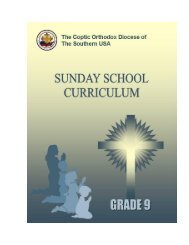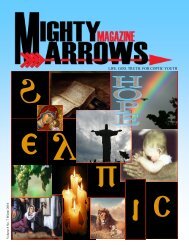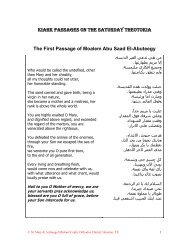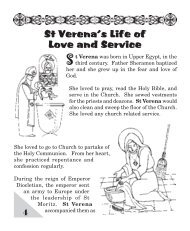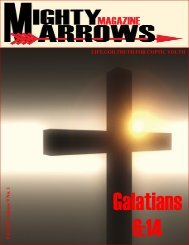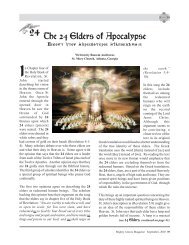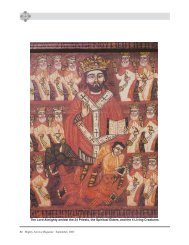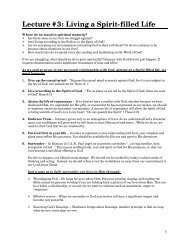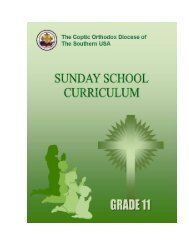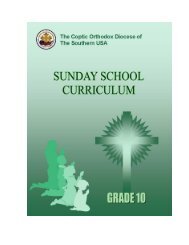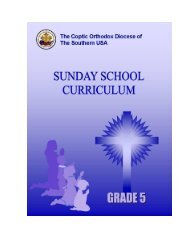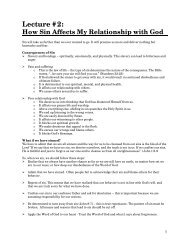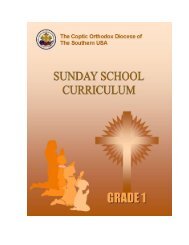Grade 12 - Coptic Orthodox Diocese of the Southern United States
Grade 12 - Coptic Orthodox Diocese of the Southern United States
Grade 12 - Coptic Orthodox Diocese of the Southern United States
You also want an ePaper? Increase the reach of your titles
YUMPU automatically turns print PDFs into web optimized ePapers that Google loves.
Sunday School Curriculum <strong>Grade</strong> <strong>12</strong><br />
Week 2 - The First Epistle <strong>of</strong> St. John (Part I)<br />
Objective:<br />
To get acquainted with <strong>the</strong> epistle and its writer.<br />
Memory verse:<br />
―We know that we have passed from death to life, because we love <strong>the</strong> brethren. He who does not<br />
love his bro<strong>the</strong>r abides in death‖ (1 John 3:14).<br />
Introduction:<br />
I. The Writer <strong>of</strong> <strong>the</strong> Epistle<br />
He is John, <strong>the</strong> son <strong>of</strong> Zebedee, from Be<strong>the</strong>sda in Galilee. Although his name is not<br />
mentioned in this epistle, it has been attributed to him due to <strong>the</strong> similarity between its<br />
contents and those <strong>of</strong> <strong>the</strong> Gospel in his name, because he speaks in both about:<br />
a. The eternal Word (1 John 1:1,2).<br />
b. The Incarnate Word that grants life to believers (1 John 1:14; 1 John 10:10; 1 John 4:2.9).<br />
c. Faith that transfers <strong>the</strong> Christian from death into life (1 John 5:45; 1 John 3:14).<br />
d. Love being <strong>the</strong> most important feature <strong>of</strong> a believer (1 John 3:34,35; 1 John 2:11).<br />
He is <strong>the</strong> bro<strong>the</strong>r <strong>of</strong> James, and his mo<strong>the</strong>r is Salome (<strong>the</strong> cousin <strong>of</strong> <strong>the</strong> Virgin Mary). His<br />
fa<strong>the</strong>r was a fisherman.<br />
He is <strong>the</strong> writer <strong>of</strong> <strong>the</strong> Gospel according to John, <strong>the</strong> three Epistles and <strong>the</strong> Book <strong>of</strong><br />
Revelation.<br />
He is <strong>the</strong> only one who did not die as a martyr, yet he underwent a lot <strong>of</strong> torture. He passed<br />
away at <strong>the</strong> beginning <strong>of</strong> <strong>the</strong> second century at <strong>the</strong> age <strong>of</strong> ninety-eight.<br />
He preached <strong>the</strong> Word in Asia Minor and was banished to <strong>the</strong> Isle <strong>of</strong> Patmos.<br />
II. To Whom Did He Write This Epistle?<br />
He wrote it to believers, originally Gentiles, who had come into <strong>the</strong> faith. He aimed at preserving<br />
and warning <strong>the</strong>m against idols (1 John 5:21).<br />
III. Why Was It Written?<br />
Heretical teachings appeared and were spread by false teachers:<br />
Dualism: They believed that <strong>the</strong>re are two gods; a good god who created <strong>the</strong> spirit and an evil<br />
god who created matter like <strong>the</strong> flesh.<br />
Gnosticism: They imagined that <strong>the</strong>y could attain salvation through knowledge only.<br />
IV. What Is The Goal Of Writing This Epistle?<br />
So that our joy may be complete (1 John 1:4).<br />
That we may keep away from sin (1 John 2:1).<br />
To avoid deceivers (1 John 2:26).<br />
To know that life is eternal (1 John 5:13,14).<br />
146 PENTECOST PERIOD



